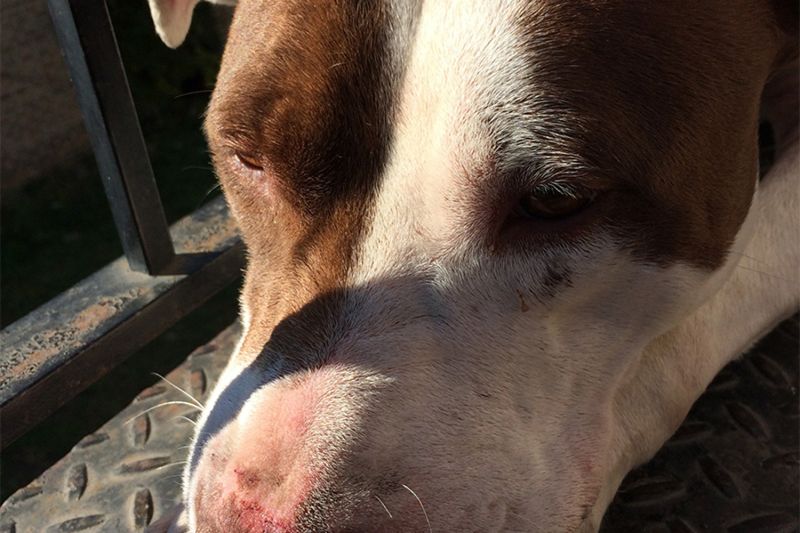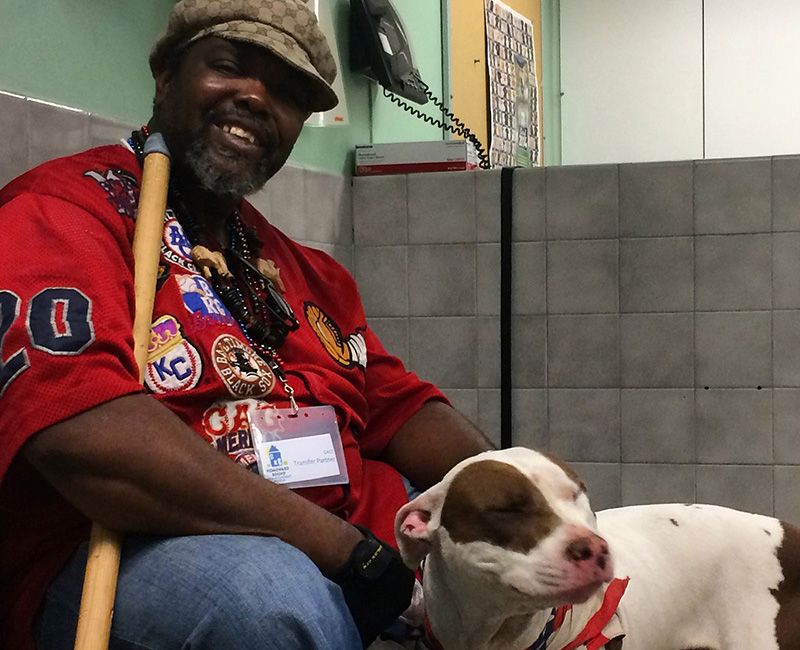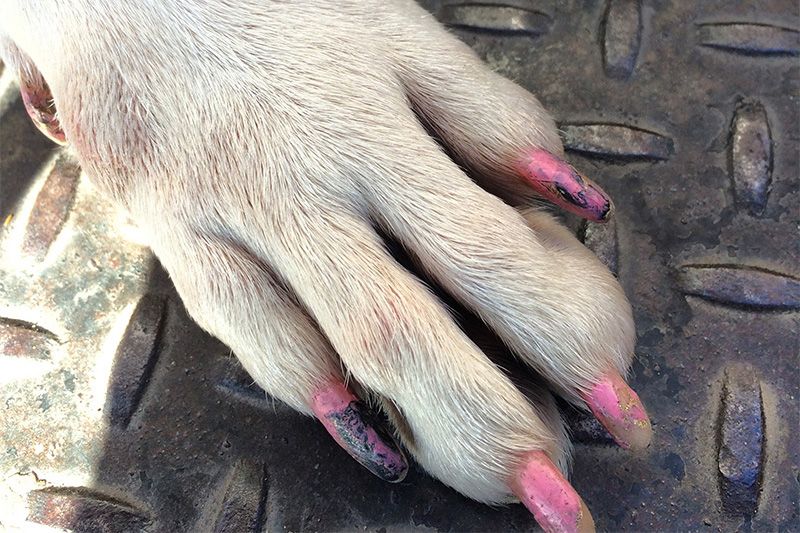Return-to-owner
How will you re-evaluate your shelter’s RTO policy to tell a different story?
March 28, 2017

I was about 8 years old as I stood with my dad and his friend and toddler-age son. We were watching the Chicago Blackhawks warm up, the players flipping hockey pucks up into the stands. We must have gotten caught up in the excitement, because when my dad’s friend looked down, his son was nowhere to be found.
The next 45 minutes were a frenzied blur as my dad and his friend were shuttled from usher to usher and finally to guest services after asking around if anyone had seen a small boy wandering the seats alone. As we stood at the guest services window, an usher in a red vest hurriedly walked towards us with the friend’s son in tow. What I remember most is the sense of relief. My dad’s friend thanked the usher profusely, while the usher empathized with him, saying he couldn’t imagine what he must have been going through. Everyone was truly overjoyed that the child was back where he belonged. There was no questioning of the father about how you could let something like this ever happen. There was only empathy.
When I got into animal welfare several years ago and first heard the acronym RTO (Return-to-Owner), it conjured up the Blackhawks game. RTOs, how lovely I thought. Is there anything in the world that invokes a greater sense of relief than being reunited with a loved one? When a pet gets loose and ends up at the shelter, that’s the system working. When a person shows up at the shelter to be reunited with their pet, that’s the system working. I couldn’t wait to include RTOs as a service in my work with Pets for Life. Pure joy all around, I thought.
Unfortunately, now having worked on RTOs for several years, more times than not they highlight a broken system.
In the most basic way, RTOs represent a series of stories, much like the one I told at the beginning of this blog. I got to tell that story myself, as I remember it, but not everyone who loses a pet gets that privilege. When an animal shows up at the shelter without a lot of information, shelter folks often feel compelled to craft a story of how or why the pet came to be there. When the owner shows up to reclaim their pet, all too frequently the story the shelter has created doesn’t match the story the owner tells. And the owner’s story gets lost in the story we’ve already told ourselves about them.
Take the story of PFL client Kevin and his dog, Boss Lady. This is how Boss Lady’s cage card read when I got to the shelter:
- Name: Unknown
- Age: Unknown
- Breed: Pitbull mix
- Sex: Female unaltered
- Color: Brown and white
- Available Date: 11/3/16
- Microchip: N/A
- Intake Date: 10/25/16
- Intake Type: Owner Surrender
- Comments: CAUTION, aggressive
To the left of the information was a picture of Boss Lady on the tile floor of the shelter. She didn’t have her own collar or tags, just the white and blue slip lead provided by the shelter.
What was Boss Lady’s story? You probably already have some ideas.
But here’s the real story.

The night before, Kevin, Boss Lady’s owner, had taken her on a walk to the corner store. He takes her everywhere. He ran into the store and left Boss Lady tied up outside, as he’d done many times before. As he walked outside, police officers tased him. He fell to the ground and hit his head. He was arrested and taken away in an ambulance. Confused and hurt, on the way to the hospital Kevin asked about Boss Lady. With no one to take her home, police had put her in a squad car and taken her to the local shelter.
The next morning Kevin was released from the hospital and police custody. He was not charged with anything; the police explained the situation was a case of mistaken identity. It was their mistake, yet Kevin was injured and without his dog. He went straight to the shelter. They found Boss Lady and slid Kevin an invoice for $110, explaining he would need to pay this amount to take his dog home. Kevin is disabled, walks with a cane, and due to his disability cannot hold a steady job. He didn’t have $110. But even after he explained his story to the front desk staff—he was still wearing his hospital bracelet—he was told if he couldn’t pay he couldn’t take Boss Lady without paying.
Luckily, at the shelter front desk he saw a Pets for Life sign, letting people know we will pay for RTO fees. So he immediately called us.
This is where the story changed.
It doesn’t always happen, but too frequently we see the shelter truly listen to the owner’s story and start to treat the owner better when PFL shows up to cover RTO costs. Because of inflexible policies, processes and fees, if we hadn’t intervened, Kevin would not have gone home with Boss Lady that day. She would have been considered a “homeless” dog, and due to no fault of his own, Kevin would have lost his family member. And the shelter staff wouldn’t have gotten to see the bond between these two, Boss Lady wagging her tail incessantly as they opened the door and as she rushed into Kevin’s arms, the judgment of the “owner surrender” label on the cage card melting away.

After getting to know Kevin and Boss Lady, I can tell you this is how Kevin would fill out Boss Lady’s cage card:
- Name: BOSS LADY
- Age: 2 years and 238 days old. I got her as a little puppy around Halloween.
- Breed: Chill cuddler who thinks she’s a lapdog, but can do zoomies when excited
- Sex: My baby girl
- Color: She is mostly white and the same color brown as our favorite blanket; she has brown patches on both eyes, a brown spot just below her shoulders and another brown spot on her left hind leg. Her nose is pink and brown, and this one pink spot looks like the shape of a heart. Her belly is really soft and a pinkish red, and when she rolls around on the carpet it gets brighter red—but she just loves it so much...
- Available Date: She’s pretty much free to hang out with me whenever; we go on tons of walks and she’s always available to play with the tennis ball in the grassy lot next to my apartment. Most Fridays I paint her nails bright pink to match her nose and belly. So yeah, I would say she’s always available.
- Microchip: Now she’s got one!
- Intake Date: I got her in October 2014. Most of my family lives in Iowa so it can get pretty lonely here in Chicago. I wanted a buddy to fill the void and my neighbor needed to find a home for her as a puppy.
- Intake Type: Forever companion
- Comments: I’m so happy she’s home, I don’t know what I’d do without her. Love you, Boss Lady.
I wish I could say that Kevin and Boss Lady’s story was completely out of the ordinary. Unfortunately, it’s not. I could write a weekly blog about the RTO sagas our small Pets for Life team has uncovered across the country. There is story after story of people not being reunited with their pets for a variety of unjust and unfair reasons: not being able to afford the hold fees, being threatened with citations or charges, being treated as a suspect or deemed unworthy. There are even more stories that never get told because an owner doesn’t know where to look for their pet or is too scared to engage with the system.
The stories we tell about others who look a certain way or live in certain zip codes often invalidate the real stories people are telling us about themselves. If someone comes looking for their pet, that means they love and want their pet. Let’s all find a way to make it happen and as painlessly as possible.
Let people tell their own story. Listen. Empathize. Re-evaluate your shelter’s RTO policy and fees so people aren’t faced with the option of paying exorbitant costs or leaving their pet in the shelter. Most importantly, hear people’s stories without judgements or preconceived notions. The more understanding we give and support we extend, the more feel-good RTO stories we will have to tell. That’s the system I want to be a part of.

